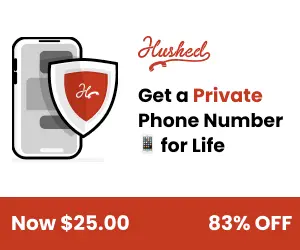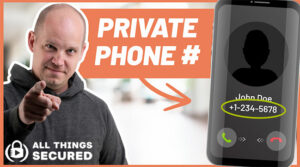In an increasingly unpredictable world, personal safety and security has never been more essential. Whether navigating bustling urban environments or enjoying the tranquility of suburban life, being prepared and aware can significantly enhance your safety and peace of mind.
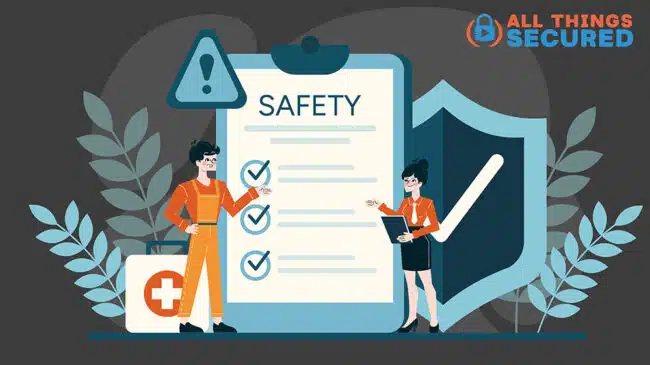
From honing your situational awareness to maintaining physical fitness, each section provides actionable insights designed to empower you to take control of your personal safety. By integrating these practices into your daily routine, you can build a resilient foundation that safeguards both your physical and digital well-being.
Learn Situational Awareness
A core pillar of physical security is something known as situational awareness.
What is Situational Awareness?
At its most fundamental level, situational awareness is the ability to pay attention to what is happening around you.
When you are out in public, recognizing potential threats and hazards before they affect you is important to staying safe and reducing stress. What are some simple ways to increase your situational awareness?
- Minimize the time you spend looking at your phone: Looking down at your mobile or tablet device distracts you from being able to see what’s happening around you.
- Keep an eye out for abnormal behaviors and events: You’re looking for things that don’t fit in with the environment. If a person is loud and obnoxious in a relatively quiet place, or someone is abnormally quiet in a loud environment -pay attention. If a car has been circling the parking lot, but not taking any of the available spots, consider why that might be the case.
But be careful not to jump to conclusions and suspect everyone. The point here is to stay reasonably alert, so that you can quickly respond to any danger or inconvenience that comes your way.
Maintain Physical Fitness
Your health and fitness is critical to your personal security. Should you ever need to flee
trouble, you want to know you will be able to without causing further harm or injury.
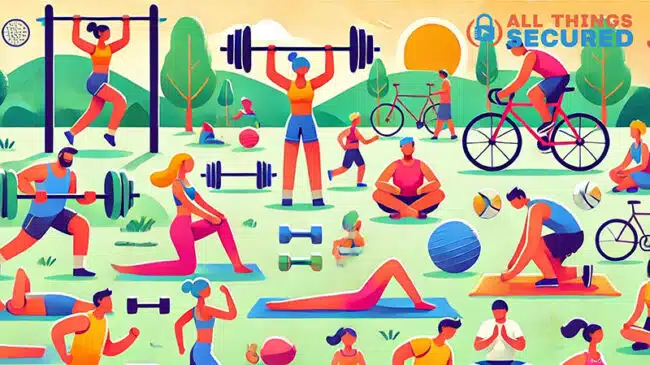
Alternatively, if someone you care about is in danger and you need to respond, your ability to move quickly and easily will be imperative. This doesn’t mean you need to be an all-star athlete. But spend time on a regular basis moving and stretching, getting your heart rate up, and staying active.
You never know when you may need to call upon your body to respond to a crisis.
Carry a Small Emergency Kit
A small container of items that help you respond well to both daily challenges and potential emergencies is a valuable thing. Often called an EDC (every day carry) kit, you can slip it in your pocket, backpack, or purse and you’re all set.
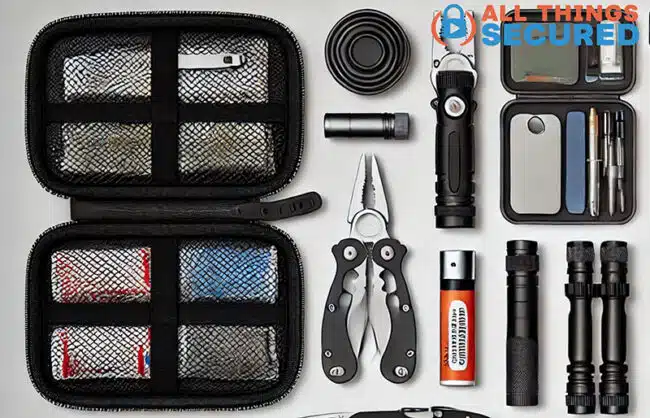
Some key questions to ask when building this kit are:
- What might slow me down during the day if I don’t have it?
- What kind of accident might happen that I can respond to on my own with the right tools?
- How can I help take care of those I am responsible for?
Consider these items as starting points, and adjust based on your personal needs:
- A small first aid kit: Bandaids, antiseptic gel, pain relievers. Here’s an example of an extensive first aid kit.
- A small pocket knife for opening boxes, removing tags, or cutting tape, string, etc. Search Amazon for “EDC Knife” for some ideas.
- Granola bars and electrolyte packets to keep you energized on the go.
- A handkerchief for cleaning up messes and drying hands.
- An extra charging cable or power bank for your mobile devices.
Communicate Your Travel Plans
An essential part of personal security is making sure trusted people know your travel plans and rhythms.
Someone should always have some idea of where you are and when you plan to return. Whether you are just out running errands or traveling long-distance, always make sure someone knows your general plans and time table. A quick and easy solution is to share your location in Google maps with a family member.
Whether you run into a crisis, or are unexpectedly delayed, it’s helpful to know that someone has your back and can respond with help if necessary.
Have an Emergency Response Plan
Most people assume that a crisis will never happen to them. And with good planning and situational awareness, that very well may turn out to be true.
However, it is still important to take the time to think and plan through how you would respond to an emergency. Consider the likely risks you may face, based on your activity and environment.
- Car accident?
- Severe weather?
- On the job injury?
- House fire?
Once you have identified possible risks, take the time to put together a proper response plan. Determine first how you might reduce your exposure to the risk. Then outline the steps you would need to take to remove yourself from danger and get help.
It is always easier to plan how to respond to a crisis before it happens, than to wait until you are in the midst of one. And often it is the act of planning against a crisis that is the most effective means of mitigating it.
Practice Stress Inoculation
Stress inoculation is an underrated part of personal security. Emergency situations and security crises are inherently stressful. Panic and shock are legitimate risks for people who are caught unprepared. Stress inoculation is taking time to put yourself under moderate stress, intentionally and in a safe environment.
Stress inoculation is taking time to put yourself under moderate stress, intentionally and in a safe environment.
Building this kind of stress inoculation has two major benefits:
- It allows you to develop a greater resistance to stress, which in turn reduces the likelihood of panic.
- It provides you the opportunity to study and understand how your body reacts under stress. Do your hands start to shake? How elevated is your heart rate? Can you still think clearly and make the right decisions?
The goal here is not to add unnecessary stress to your life, but to provide an opportunity to better understand yourself and how you might react in a high stress, emergency situation.
Building up a tolerance to stress and having a greater awareness of your biological responses will drastically increase your ability to respond well in a crisis.
Learn Basic First Aid
Learning basic first aid is an important life skill that will allow you to better care for yourself and others. Take the time to learn how to stop bleeding, clean a wound, or check for heat stroke and hypothermia. Study and practice how to use a tourniquet. Sign up for a CPR class.
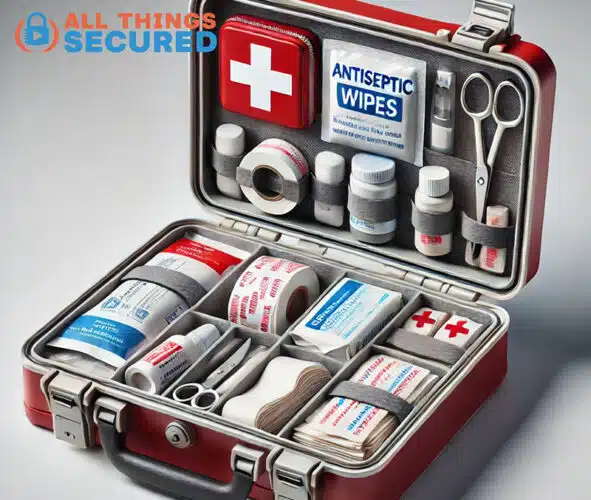
At the very least, you will gain the skills necessary to take care of minor medical issues confidently and safely. And at the most, having first aid knowledge and skills could help save a life in an emergency situation until professional medical care arrives.
American Red Cross is a great place to get affordable training near you.
Avoid Isolation
A person who is isolated is at high risk of becoming a victim. Whether you are traveling in a foreign country or just taking an evening walk, you put yourself at greater risk if you separate yourself from friends and neighbors who can help.
There are a wide variety of ways to avoid isolation. Phones are one of our easiest ways to do so. In addition, traveling with friends when you go to a new place, building good relationship in your neighborhood, and communicating travel details (see #4) can all help you avoid becoming isolated.
Keep in mind that isolation is not just physical, but can also be a mental or emotional state as well.
Develop a Network
Relationships are another vital part of personal security. None of us are James Bond or Jason Bourne. We are not going to have all the tools and skills on our own to face every challenge life brings.
There is immense value in building and developing relationships in your community – there is safety in numbers! For example:
- One person might have a truck to pull others out of a snow drift.
- Someone else might be really good with tech security.
- Another may have first responder knowledge they are willing to use and share.
Living in a community built on strong, healthy relationships allows us to build a network of people who can work together to enhance the safety and security of the whole group.
Practice Safe Online Behaviors
Personal security is not just about staying safe physically, but also staying safe digitally. In today’s world one can impact the other.
It is vital that you know and understand the risks you face online, things such as how you use the internet and the kind of digital footprint you leave. There is an ever evolving army of digital and virtual threats out
there.
It is important to stay up to date on what risks you face, and to always vet your online services. Some starting suggestions include:
- Always use two factor authentication;
- Use unique and complex passwords – along with a password manager;
- Follow the S.T.O.P method and never follow an unrequested link;
- Keep your personal information private
Final Thoughts: Personal Safety & Security
Incorporating these essential tips into your daily routine will significantly enhance your personal safety and security. By staying aware of your surroundings, maintaining good physical health, and preparing for potential emergencies, you can minimize risks and feel more confident in any situation.
Remember, personal safety and security are ongoing practices that require both vigilance and planning to ensure your well-being.
